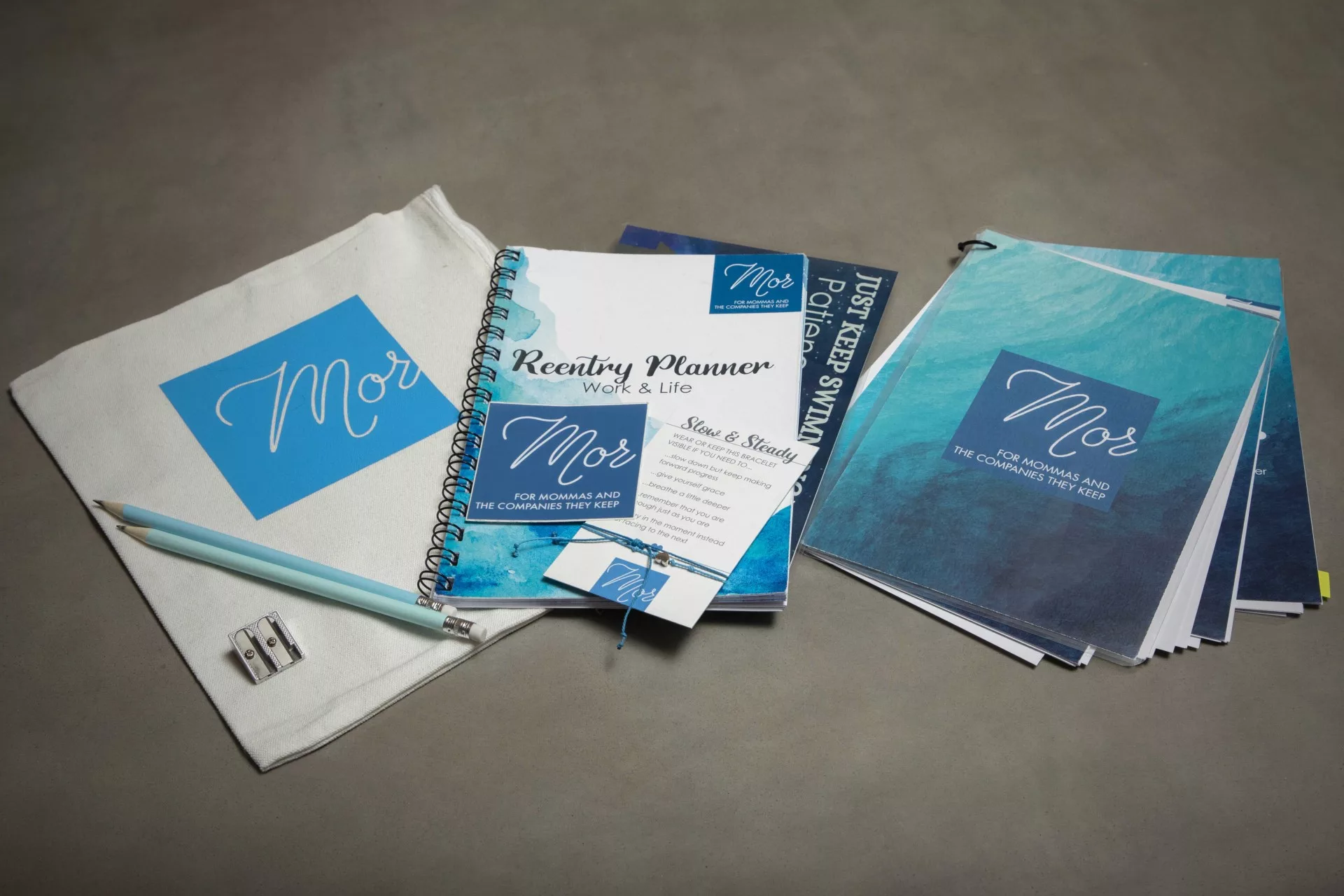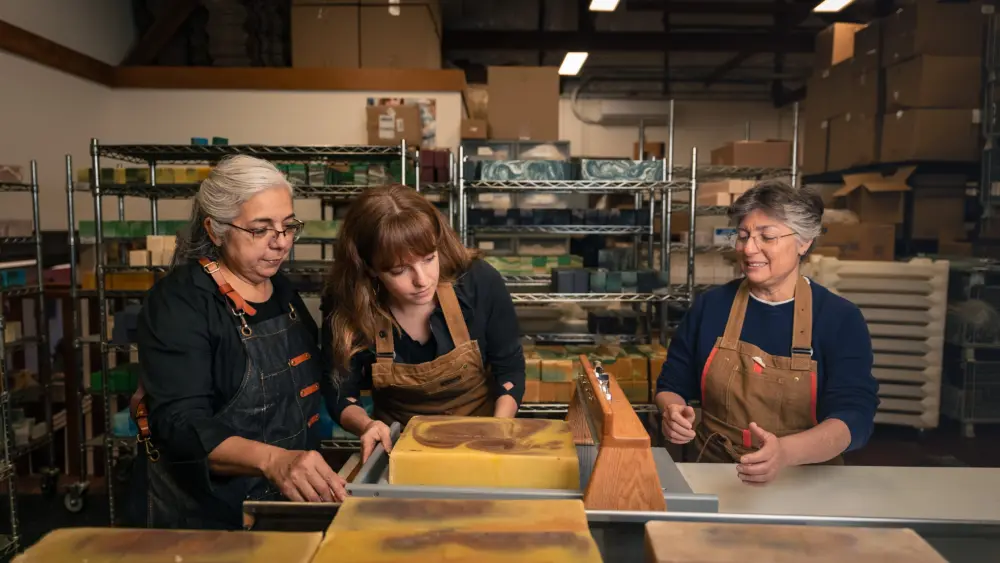
According to a 2022 report from the U.S. Bureau of Statistics, women made up more than half of the national labor force with a participation rate of 56.8%. In California, 55.3% of our labor force last year was driven by 8.7 million females. With so many women contributing to the workforce, keeping them motivated to stay employed is important for the health of our economy. But when it comes to starting a family, being a working mom can be complicated, both logistically and emotionally, and almost half of qualified women with children leave their careers, or “off-ramp” for a period of time.
Blythe Carrillo has been enthusiastically working in marketing for 20 years. She is successful in her career and enjoys the work she does, and back when she had her children (who are now 13 and 10) not working was not an option for her. She and her husband needed two incomes to live comfortably in Sonoma County, especially with their growing family to support. Carrillo was able to navigate having her first child, a daughter, with a graceful return to work through thoughtful planning and an employer who offered her flexibility, but when she had her second child, a son, she found returning to her place of employment and juggling parenthood to be a struggle.
Preparing for maternity leave
When it comes to preparing for a maternity leave there are myriad aspects to plan for—such as creating a handover plan for work projects and duties, finding a way to stay visible while out on maternity leave, and designing a course of action for a return to work which includes childcare. As an expecting mom, and eventually a new parent, a woman has to do all of this while maintaining her confidence and grappling with mixed feelings of excitement, and sometimes a bit of guilt when it comes time to leave her child to return to the office. Many women feel a tremendous amount of pressure to prove themselves after they’ve been out on maternity leave and return to work, as well as a need to prioritize being a nurturing and attentive parent. Having a child changes a woman’s life completely, and figuring out how to balance work and life takes on a whole new meaning after having a baby.
When it came to her maternity leave and work reentry, Carrillo found she had no one with whom to discuss topics beyond typical human-resources-type logistics. What she wanted was someone to talk to about how to balance motherhood and a career, as well as what her career trajectory might look like after the hugely transformational event of having a child. Her own experience with what was lacking in terms of support was her inspiration for the creation of Mor, a maternity coaching and consulting service. Founded as a nonprofit and focused on helping working moms and companies with communication, clarity and support, Mor’s mission is to raise awareness, through education and personal coaching, of the profound impact of having children on our lives, careers and those around us. Carrillo, who is Danish American, decided to use the endearing Danish word for mother, Mor, for her company name. Currently working part-time as the marketing director at Santa Rosa-based marketing firm TIV Branding, she spends the other half of her work life expanding Mor as coach, founder and CEO.
Maternity coaching exists as a known service in Europe, South Africa, Australia and other countries, and is catching on within the United States at big companies in major metropolitan areas—but the service hasn’t hit a stride at most smaller businesses. Mor strives to bring maternity coaching to local professional working moms in the North Bay. And she’s committed to doing so in a democratized manner—meaning any working mom who is interested and committed to maternity coaching can apply and receive the service at no cost. Mor can offer maternity coaching at no cost to working mothers because of a funding model that leverages the concept of crowdfunding via companies.
Nonprofit with a Crowdsource Funding Model
Carrillo originally envisioned her company would be based on a traditional for-profit business model. According to the Sonoma County Economic Development City Reports of 2021, there are at least 18,000 businesses combined in Cloverdale, Healdsburg, Petaluma, Rohnert Park, Santa Rosa, Sebastopol, Sonoma and Windsor. Carrillo wondered how many of them would pay for maternity coaching for one mom. After talking with friends, the idea of forming a nonprofit corporation with a crowdsourcing model was embraced. Carrillo then set about building a model based on different levels of sponsorship, including a tier dedicated to founding companies—Mor’s “early adopters.”
One benefit of Mor being a nonprofit is that business sponsorships in most cases are tax deductible, similar to when a company sponsors a nonprofit event. In addition to the smaller annual investors, Mor’s model includes getting five innovative, early adopter companies on board with sizable donations to initiate momentum. The top level of founding company sponsorship, Mor & Mor, consists of qualified sponsors contributing $5,000 or more, followed by Less is Mor sponsors donating $1,000, and One Mor, requiring a $500 qualified sponsorship. The founding companies are prominently highlighted as qualified sponsors in all public relations and marketing efforts during Mor’s launch. Additionally, in recognition of companies that contribute to getting Mor off the ground, those businesses will be noted as a Founding Company with a permanent link and listing on Mor’s website. Carrillo’s plan is that the eventual average annual donation needed by a company will be so small ($10 per month or $120 annually) that it will be difficult for companies not to want to participate. As Mor grows, she plans to also leverage additional funding from grants, private donations and large corporate sponsorships.
In addition to the services Mor offers to companies who participate in support of the nonprofit, Mor also offers maternity leave company coaching and consulting at the rate of $90 an hour, and a manager-support and policy review service. Carrillo will work with a business that wants to directly pay for Mor coaching or consulting services, customizing a package tailored to their needs. Possible applications of services include: manager and internal team coaching prior to a team member’s maternity leave to help ensure a smooth transition into leave and upon return; leave policy review—not from a legal or HR standpoint, but rather for basic comprehension and application; identification of areas to improve offerings to retain and attract employees; and other areas regarding maternity leave or working parents.
“Even companies that are not likely to use the service for one of their employees can make a contribution that will go toward Mor’s services and will contribute to the good of the community,” says Carrillo. She uses an example of a local auto body shop who might not have any female employees that would use Mor’s services. “Though the shop’s workers might not use the services themselves, one of their spouses or partners might,” says Carrillo. She points out that the employees might have a sister, niece or friend who might use Mor, and that woman’s contribution to the workforce is an important one. Mor’s model relies on companies recognizing that maternity leave policies in the U.S. are fundamentally lacking and that supporting working parents is to everyone’s benefit. “A woman’s reentry into the workforce after having a baby helps to sustain and influence the local economy in many ways” says Carrillo.
One of Mor’s early contributors is Carrillo’s current employer, TIV Branding. As a family-owned company, TIV Branding believes that new parents deserve more support than they currently receive through sorely lacking state and federal policies. “On the flip side of the coin we also experience the challenges small businesses face in supporting new parents without broader institutional policies,” says Brandt Hoekenga, founder and creative director.
Carrillo has also engaged another worthy nonprofit to support Mor: the Junior League of Napa-Sonoma. “After thoroughly reviewing numerous grant-worthy applications for this year, the Junior League of Napa-Sonoma chose to become an early supporter of Mor coaching,” says Corey Theune, president of the organization. “As with other fledgling nonprofits we’ve helped fund, [Mor] addresses a critical need of mothers to enable their well-being alongside that of their children.” Theune appreciates that his organization and Mor share a commitment to strengthening families and empowering women. “Our goals and mission align well in the community and we’re pleased to have the opportunity to bolster this initiative,” says Theune.
Carrillo’s reliance on a crowd-sourcing model to fund no-cost maternity coaching begs the question: Why not simply have moms or companies pay for the services directly? Afterall, support for better maternity-leave practices spans political and gender lines and, according to Carrillo, if you ask a room full of people if better policies should exist the majority will say yes.
Yet, she points out, only 23% of Americans have access to paid family leave through their employer. “It’s a case of intentions not matching reality,” she says.
And so Mor relies on an “abundance mindset”—the belief that if we work together as a community there will be enough for everyone. Carrillo hopes that if a company reaps the benefits of many employees using Mor’s services, they will increase their donation when capable. If a mom can pay for the program they are welcome to do so—and their donation will fund the program for another expecting mom whose company might not be participating in sponsorship, thus paying it forward.

The Mor Way
Based on established programs and those developed by Carrillo herself, Mor maternity coaches offer individual sessions to help clients clarify intentions, set goals areas of work or life, work through hardships, and curate strategies for moving forward before and after having a baby. They will also address some of the areas more traditionally associated with coaching, like communication or career goals, but from an angle relevant to impending or recent maternity. The program from Mor typically includes four pre-maternity-leave and six post-maternity-leave coaching sessions, with additional digital check-ins. The topics, timeline and schedule are all determined by the mom with prompts and reminders from Mor.
The working mom-to-be receives a welcome package including Mor’s program workbook, as well as educational information and personal worksheets. Also included are Mor’s reentry planner and a few touchstone items. Coaching is driven by the participant who completes a questionnaire to drive the coaching topics. Some areas that the coach might explore with the client are how the woman has felt during the pregnancy, if she is amenable to altering her work schedule, and whether she wants to continue working due to economic factors or if her impetus is driven by her enjoyment of the work. One major topic discussed between the coach and mom relates to taking a career break and how that can affect a woman’s future career and finances. Mor wants moms to feel they have a partner in their coach, someone who understands what they are going through and can help them with short- and long-term planning. The cost to Mor to provide these services is approximately $1,200 per participant.
Currently, Carrillo is performing the coaching—having completed International Coaching Federation training and is working toward her certification credential. She also has another coach on call who is available to help as needed. Her goal is to ultimately have a number of different coaches available for moms to choose from, matching up each mom with a coach they feel is the best fit for them. Carrillo also would like to eventually open up Mor’s coaching services to any parent or guardian who needs support, including fathers.
Post-COVID, women have been leaving the workforce and many businesses are concerned about their ability to fully staff. With low unemployment rates, hiring is a challenge and companies are looking for ways to increase retention and avoid attrition. Carrillo believes her program not only assists moms, but can be an immense benefit to employers by helping them retain valued employees, while reducing the recruitment and training costs that occur with high staff turnover. Companies are often focused on their legal obligations regarding maternity leave and often overlook their wider duty of care to an employee that can make that employee feel valued. Carrillo believes Mor coaching can fill in those gaps.
Though there are big companies that pay attention to the importance of helping women prepare for maternity leave and reentry to their jobs by utilizing consulting firms such as Talking Heads to help their pregnant and postpartum employees transition, privately funded company support is often something smaller businesses cannot afford. Even back in 2014, a nationwide survey conducted by the Australian Human Rights Commission titled Supporting Working Parents: Pregnancy and Return to Work National Review showed when women feel supported during their maternity leave and reentry, that they feel valued and are more likely to stay with their employer—and are more productive upon their return. Carrillo believes with Mor’s services and funding model even small businesses can contribute and benefit from helping support women during this pivotal time in their personal and professional lives.
The average retirement age for women is 63, which means the majority of women spend more than half their career working after they have children. A successful return to work after having a baby is good for community health in many ways and also good for the economy.
Carrillo would like to see everyone across gender lines and the economic spectrum be able to receive the type of services that Mor offers, but without funding it rarely happens. She is hoping her nonprofit corporation soars so she can eventually offer additional benefits such as a Returnship Program (think internship program specifically geared to mothers that have taken a career break) and a Maternity Leave Scholarship Program, to supplement existing maternity leave to provide moms who need more time before reentry.
Carrillo also hopes that once her model is successful at a local level, Mor can build a social franchise which provides the tools and structure for additional chapters, or social franchises, to open in other communities. Psychoanalyst and parent educator Elaine Heffner once said, “Women do not have to sacrifice personhood if they are mothers. They do not have to sacrifice motherhood in order to be persons. Liberation was meant to expand women’s opportunities, not to limit them. The self-esteem that has been found in new pursuits can also be found in mothering.”
New pursuits can also be discovered for moms in relation to their jobs, especially when they have an organization like More to support them.



